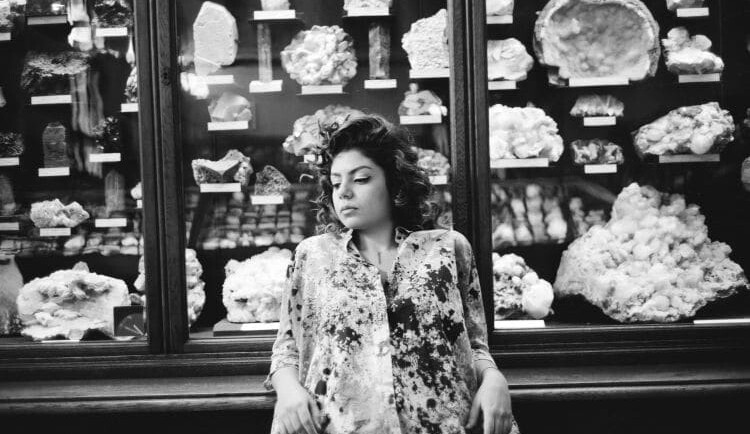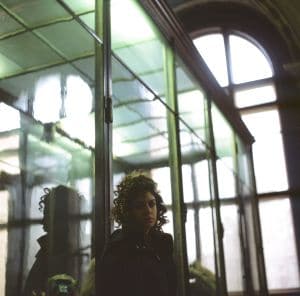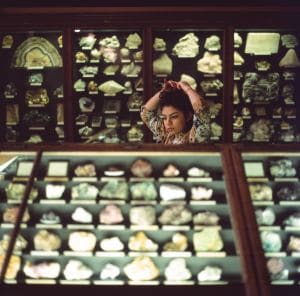
“Zangaar” is ROJIN SHARAFI’S new release and second album on ZABTE SOTE, a label for experimental music from Iran. SHARAFI, who comes from Tehran, has been living, studying and working in Vienna for eight years, and was awarded in 2018 the AUSTRIAN PRIZE FOR COMPOSERS. She’s working at the interface between electroacoustic music and visual media art, but for “Zangaar” SHARAFI returned to literature as poems inspire the eight pieces on the album. In an interview with Christoph Benkeser, ROJIN SHARAFI explains how she found her way to poetry, why coincidences need to happen and what “Zangaar” means to her.
You are releasing your second album “Zangaar” on Zabte Sote, a sublabel for Iranian music of the artist Ata Ebtekar. How did you meet Ebtekar who produces music in Tehran?
Rojin Sharafi: Ata Ebtekar asked for a track in early 2018 for the first Zabte Sote release, the “Girih: Iranian Sound Artists” compilation, after Nima Aghiyani and Sara Bigdeli Shamloo (9tAntiope) introduced me to him. I was very happy that he wanted to start a label. Personally I met him in summer 2018 at the SETxCTM Festival in Tehran, when I was invited to perform there. I played in a famous theater there, and for me it was the first time that 150 people sat in front of me and listened to my music in a concentrated way. It was also emotionally touching to present my music on a stage in my home country.
What was this moment like, to return to Tehran with your music?
Rojin Sharafi: I composed acoustic music until I was 20. Only then did I start with electro-acoustic compositions. This big event in Tehran came early in my career. It was crazy. Besides, I could hardly believe that something like that would happen.
Why was it a surprise?
Rojin Sharafi: In Tehran there are many factors involved in organizing a big event. There are periods when things are better, because of political and social situations. If you hit the right time, it can work. But there’s always some improvisation involved.
In an interview, Ata Ebtekar linked improvisation to Iranian culture by comparing it to the traffic in Tehran: To outsiders it looks like chaos. But there is a structure that holds the chaos together.
Rojin Sharafi: Improvisation has a lot to do with allowing coincidences to happen and with making decisions on the spot. I’m often improvising with different instruments or electronic devices. In this way I record long layers and traces of different voices, which I listen to and intuitively use again after the recording, by putting them together, alienating or abstracting them. A lot happens in the moment of improvisation, but the form of the composition is important to me. I like structures, although I value improvisation. This randomness and the changes that happen in the moment and not through automation make up my music. I could hardly achieve them through post-production, because the moment and what happens in it function as part of the composition.
You are speaking of coincidence as a mistake.
Rojin Sharafi: I would like to perceive coincidences that happen as an aesthetic of improvisation – and not as something wrong that you want to actively prevent. Tracks with less improvisation, but rather more focus on the artificial composition, will take longer for me to make them interesting. If improvisational traces are there, then in turn it’s easier to let other coincidences happen.
How could one imagine this way of working?
Rojin Sharafi: I am laying individual lines one upon the other that I think might fit together to see how they react to each other. With the first album it was the other way around: I picked up individual lines and later put them together. On the current album, I often played all the lines I recorded together at the same time.

How do you determine for yourself that something doesn’t fit?
Rojin Sharafi: Sometimes the result of an improvisation is better than trying to edit the composition afterwards. An example: Recently I received from the Rokolective Festival a commission to create a soundtrack for a short non-human video. Arash Akbari, a musician from Tehran, has morphed together AI-generated data of different fungi, bacteria and other microscopic creatures, I contributed the music. The visual reference led to an auditive aesthetic. On the album, however, I wanted to have eight different sound characters. The tracks were to be different from each other and allow for a textual connection.
You create the textual connection through poems that you have written for the individual pieces. On your homepage one can find poetic texts that you wrote some years ago. The last entries date back to 2017, so what made you decide to write again?
Rojin Sharafi: I have always found the combination of literature and music exciting. On the first album I am retelling the story of an imaginary village and thus a different place seen from an observer from the ouside. With “Zangaar” I’m narrating what I have experienced myself. For the third album I’m planning a combination of both approaches. I want to narrate a fictional situation that I’m experiencing from my own point of view – a combination of first and third person.
Nevertheless the reference to literature was not your first focus for a while. What brought you back to it?
Rojin Sharafi: Reading and writing, watching movies and taking photographs used to be my main hobbies. When the first album came out and I automatically put a stronger focus on my music, these hobbies moved into the background. On my trip last summer, I was able to reactivate them quite naturally, because breaking out of everyday life allowed me to look at my everyday life from a distance. Suddenly I was able to write again. In the stress of everyday life it was always difficult to reflect on what I had experienced.
Where did this journey take you?
Rojin Sharafi: To the Côte d’Azur. My sister is living in France since last year, we traveled together with our parents. It was a time when I had no worries, and I could relax. That rarely happens.
“NEITHER THE MUSIC NOR THE POEMS SHOULD BE IN THE FOREGROUND OR BACKGROUND.”
You used this relaxation productively, like Roland Barthes’ writer on vacation.
Rojin Sharafi: I wrote poems. In the beginning I didn’t know that an album could be made of it. I had a project in mind, where I wanted literature and music to be understood as equal partners. Neither the music nor the poems should be in the foreground or background, I gave both the same importance. However, the poems preceded the tracks, and the attempt was to combine them with music. I was able to do this well on this journey because I didn’t feel any pressure. In everyday life this hardly happens, which has to do with my relationship with Vienna. I came here in 2012. When I’m looking back now, I realize that it was a difficult time for me. There was pressure, the constant proving oneself at the University of Music, which led to unpleasant situations.
What kind of memories do you have of your first time in Vienna?
Rojin Sharafi: I often had the feeling that there were many prejudices I was confronted with at once. I am sensitive to injustice. If you don’t know how to deal with the injustices – for example, because you are young or don’t speak the language well enough – it is difficult to react in the right way. In the meantime it is easier. I have grown older and have more experience.
You studied composition and sound engineering from the beginning. Did you see any differences between these two fields in terms of your experience with these situations and prejudices?
Rojin Sharafi: Only seven to ten people are admitted per year. There are fewer women – and even fewer international students. I was in a group of people from Austria and Germany. Besides, we only had male professors at that time. There was always a moment of shock when I was asked where I came from.
You were permanently in a position where you had to explain yourself.
Rojin Sharafi: It is a system that is constantly reproducing itself. Only a few are willing to open up, to risk new views and to hear several voices. This division refers on one side to a gender inequality and on the other to the origin of the people. At university I learned one truth: classical music by men, which the professors are always praising.
You are addressing the male-dominated canon of music theory.
Rojin Sharifi: I recently saw a video in which they say that what is called music theory should be renamed „Theory of 18th Century European Men“. This is a long road, which is also related to the financing of music universities. One would have to ask oneself openly which intentions are being promoted. After all, one still believes today that one can only compose interesting music if one promotes the tradition in its entirety. Yet, this attitude has a bad influence on the present of music today. I see this in the commissions that are given: Contemporary music, which is perceived as modern music of our time, ranks above electronic music, which is considered something foreign.
“Zangaar”, the title of your album, thus appears as a subtle criticism. Translated it means: “The dust of time that covers memory”.
Rojin Sharafi: I have on purpose written out an exact translation. Zangaar is the term used to describe the corrosion product that is created from sheet metal oxidated by oxygen. For me it’s like the dust of time. Often you want to sweep away this dust to see the real picture. But for me that is not possible. You have to accept the image that becomes an abstract one because of this dust. Time is an important component in this process. That is why I have tried to look at the memories and stories on this album from a distance and with a certain time-lag.
“IT IS ABOUT THE INTIMATE STRUGGLE WITH ONESELF AND THE PERCEPTION OF ONESELF AS A SECOND PERSON.”

Rojin Sharafi: I had the image in my mind where I’m placing the corrosion product on a mirror in which one sees oneself. On the piece “Toom” this thought is strong. It is about the intimate struggle with oneself and the perception of oneself as a second person.
Zangaar thus becomes an umbrella term for memories of memories?
Rojin Sharafi: Yes, the respective tracks have different relationships with the term Zangaar. There are three or four tracks that have emerged from my own memories of the past. The other tracks tell a story that I developed in the past. These were ideas for short stories or films that I wanted to tell in the context of poems. In their narrative there is no closed end, it remains open.
In this way, you prevent one truth from being pretended.
Rojin Sharafi: Yes, that makes the stories plurivalent. You can read them in different ways because there is no concrete focus within the plot. There are two stories – one in the foreground and another in the background. You might think that the story in the foreground is more important, but I’m not setting a focus instead I’m letting both stories interact with each other. For me, the story in the background seems to be even stronger in some places.
How do you distinguish between what is going on in the foreground and what is going on in the background?
Rojin Sharafi: In the sixth piece, “Choruk”, I’m retelling a beach situation. It’s calm, I’m describing the people. At the end of this snapshot there’s a dialogue between two people that adds a new meaning to the previously calm picture.
This is the interaction you are talking about. The story emerges from the background.
Rojin Sharafi: The changes in perception are taking place permanently and last only for short moments, yes.
The stories were created on a journey, since then some time has passed. How has the view on these stories changed in the meantime?
Rojin Sharafi: When I’m reading through the stories today or am looking at the pictures, I notice that little has changed. I can’t interpret them differently because they have solidified in my memory – by writing them down, by photographing them. It’s like a therapy, because when they solidify, they come to a conclusion.
That is fascinating! Thank you for sharing this process.
Rojin Sharafi: It was important therefore for me to create an idea for people who don’t understand Persian. This is difficult because it comes down to an interpretation of the interpretation. You can translate the poems or write a text as a narrative about the poem. But this falsifies the plurivalency of the poems in the original. For example, I didn’t want to give them a specific meaning in German, although they would have several meanings in Persian. With my friend Aida Ebrahimi I discussed how we could describe the meaning in a few lines.
Because the translation adds or removes something that is not intended in the original meaning.

Rojin Sharafi: The trick is to treat each track and each poem differently. For some, it is sufficient to describe the idea and leave out the realization. For others it is enough to translate a single sentence. Aida has done that wonderfully.
It’s actually fitting that you like to “tell stories in an abstract way”, as you said in the last mica interview.
Rojin Sharafi: Except for the last poem, they can easily be followed as a story. That was new for me, because I told my previous stories in an abstract way. But with “Zangaar” I wanted to tell something that could be followed.
Last year at the Viennale you set the silent film “The Warsaw Citadel” to music. Is that a form of storytelling that you would like to pursue?
Rojin Sharafi: Both approaches are interesting. Either one starts from an existing image and tries to interpret the image musically. Or new images are created by the music. I recently worked on a music video with a friend. It was a constant exchange of visual and auditive pieces, and this led to the fact that the visuals are influencing the music and the music is influencing the visuals. Projects in which other media influence my music I would also like to pursue just as much as collaborating with other musicians.
So far you have worked as a solo musician. Which circumstances have led to this new openness?
Rojin Sharafi: I performed with the singer Golnar Shahyar during the Wiener Festwochen (Vienna Festival) in mid-September. Before the concert we both spent very little time in Vienna. We met only four days before the performance, improvised together – and complemented each other wonderfully. When we listened to the recordings the next day, we tried to reproduce parts of them. However, the moment of exactly reproducing an improvisation is difficult. We agreed to include some clues in the set so that we could improvise freely the rest of the time. In the end, we played over three quarters of an hour, a beautiful experience.
Hopefully there will be further collaborations between you and Golnar?
Rojin Sharafi: Yes, we are planning further collaborations. At the moment we are also working on a project where I will play with an Iranian singer and a saxophonist. The singer plays several Persian stringed instruments and during the quarantine he was busy with traditional dance music from Iran. His last comment was that many of these styles of dance music will die out. The government shows little interest in keeping this tradition. Currently, this kind of music is only heard at weddings or funerals.
You have been living in Vienna for eight years now, calling the city your home. What is your relationship to Tehran?
Rojin Sharafi: I have a complicated relationship with Iran, although or perhaps because I’m following the political news every day. I also feel responsible, for several reasons …
What kind of responsibility are you talking about?
Rojin Sharafi: My father was politically active in his youth. At home we always talked about politics, history and social issues. In elementary school I already knew a lot about contemporary Iranian history and I felt that I had to tell other children about it. This need has remained within me, I feel that I have this responsibility.
To pass on your knowledge to other people?
Rojin Sharafi: When I was younger, certainly. Now I want to initiate changes where I’m living – for myself and for others. Since I have been living in Vienna, I have continued to educate myself about injustice and inequality. I want to challenge my surroundings, for example to initiate discussions about intersectionality. Therefore I’m always asking myself what I could contribute in my surroundings or in the music scene within which I’m moving, in order to pass on cultural but also social knowledge from Iran.
Thank you very much for the interview!
Christoph Benkeser
Links:
Rojin Sharafi (Website)
Rojin Sharafi (Facebook)
Rojin Sharafi (Soundcloud)
Translated from the German original by Julian Schoenfeld
